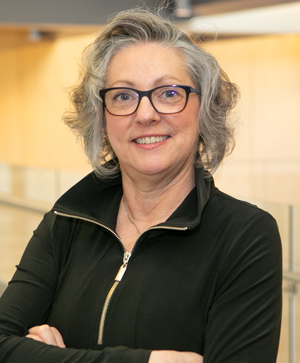UMass Chan Office of Well-Being sees greater stress, offers resources for coping with continuing pandemic
Back in early 2020, few would have imagined work, school or community life would be carried out largely over video screens. Few in medicine would have foreseen the never-ending pressure of a virus that keeps threatening to overwhelm the health care system.
And few would have imagined that even a year after vaccines and treatments became available, much of life’s routines would still be dictated by COVID-19.

Valerie Wedge, LICSW, CEAP, and director of the Office of Well-Being at UMass Chan Medical School, said her office is seeing more confusion, depression and anger than a year ago, when COVID fatigue made its way into conversation. The Office of Well-Being encompasses wellness programs and the Employee Assistance Program, a counseling and referral program for employees and their families to help manage the impacts of stress.
“It’s not just the pandemic. It’s the political divide, divide over racial issues, the impact of children going back to school and what that means for the workforce, what that means for children and parents’ responsibilities. And there’s a clear divide that we’re seeing between the vaccinated and the unvaccinated,” Wedge said. “The world is so much more challenged right now. A lot of it is COVID, but a lot of it is a culmination of all the pain and suffering that is going around.”
The omicron variant has brought a new level of frustration, fear and anger over the past months, just when it seemed there might be a light at the end of the tunnel after nearly two years of restrictions.
“People who have done all the things right, in their minds—they isolate at home, they keep their families close by, they work remotely, they’re vaccinated and wear masks—and they’re still contracting the omicron varient, and that’s terrifying,” Wedge continued. “We see that time and time again: There’s a frustration, ‘How can we still be getting sick when we’re doing all these things to protect ourselves and our family?’ And I think that turns into anger.”
Wedge said anxiety and depression continue to rise and clinicians are seeing agitated depression, in which depression is expressed through higher energy levels or a range of behaviors such as fidgeting, inability to be still, or calm oneself, instead of turning quietly inward.
Parents are reporting an enormous amount of stress, according to Wedge. First, there’s concern about babies and preschoolers who don’t have the opportunity for vaccination, and some are getting sick. Then, parents of school-age children are in constant turmoil about sending their children to school and letting them take part in sports and social activities.
“It’s a no-win situation for parents,” said Wedge. “If they send their kids to school, the risk of contracting COVID is higher. If they keep them home, what does this do to their socialization skills, their learning capacity?”
Workplace connections have also become frayed as more people are working from home.
“I think people are still trying to get comfortable with a new world,” Wedge said. “One of the things that is difficult is how to stay connected with your team. It’s a different type of practice than it was when everybody would come into my office, have some coffee and doughnuts and talk about the week.”
Coping
Wedge encouraged people to practice self-compassion, recognizing that we are all suffering and in this together. If people are struggling, they don’t have to struggle alone. The wellness and EAP programs at UMass Chan offer resources for employees to develop skills and understand how they can bring some peace and calm into their day, or access counseling to get through tough times.
“One of the most important tools is getting out every day and taking five to 10 deep breaths, just breathing the fresh air in,” said Wedge. “Because that gives us some grounding, it gives us some nature, it helps us to sustain ourselves.”
For employees needing more support, EAP offers counselors, who are experienced, licensed clinicians. Some have special areas as well, such as grief, which is a big part of what people are experiencing now.
“It’s not just the loss of a loved one, but the loss of freedom, the loss of being able to go to a restaurant and dine with friends,” Wedge said. “To be able to be less restricted and live with some sense of certainty that we’re going to get over this is really important.”
Resources and counseling for alcohol and substance abuse, which have increased too, are also available.
Wedge said that of the six dimensions of wellness—physical, intellectual, occupational, social, emotional and spiritual health—spirituality may now be one of the most helpful. Spirituality doesn’t necessarily mean religion. It could be a meditation practice or other mindful connection.
“So many have gotten away from the spiritual side during this crisis, and I do call it a crisis,” said Wedge. “I think coming back to that, through gratitude, through grounding, through finding meaning in what you’re doing, reaching out to family and friends just to say hello, or doing something for someone else can enrich your life so much. It can help you see that there is a common humanity, and we can work together to at least bring a little joy and happiness to those who are not doing so well.”